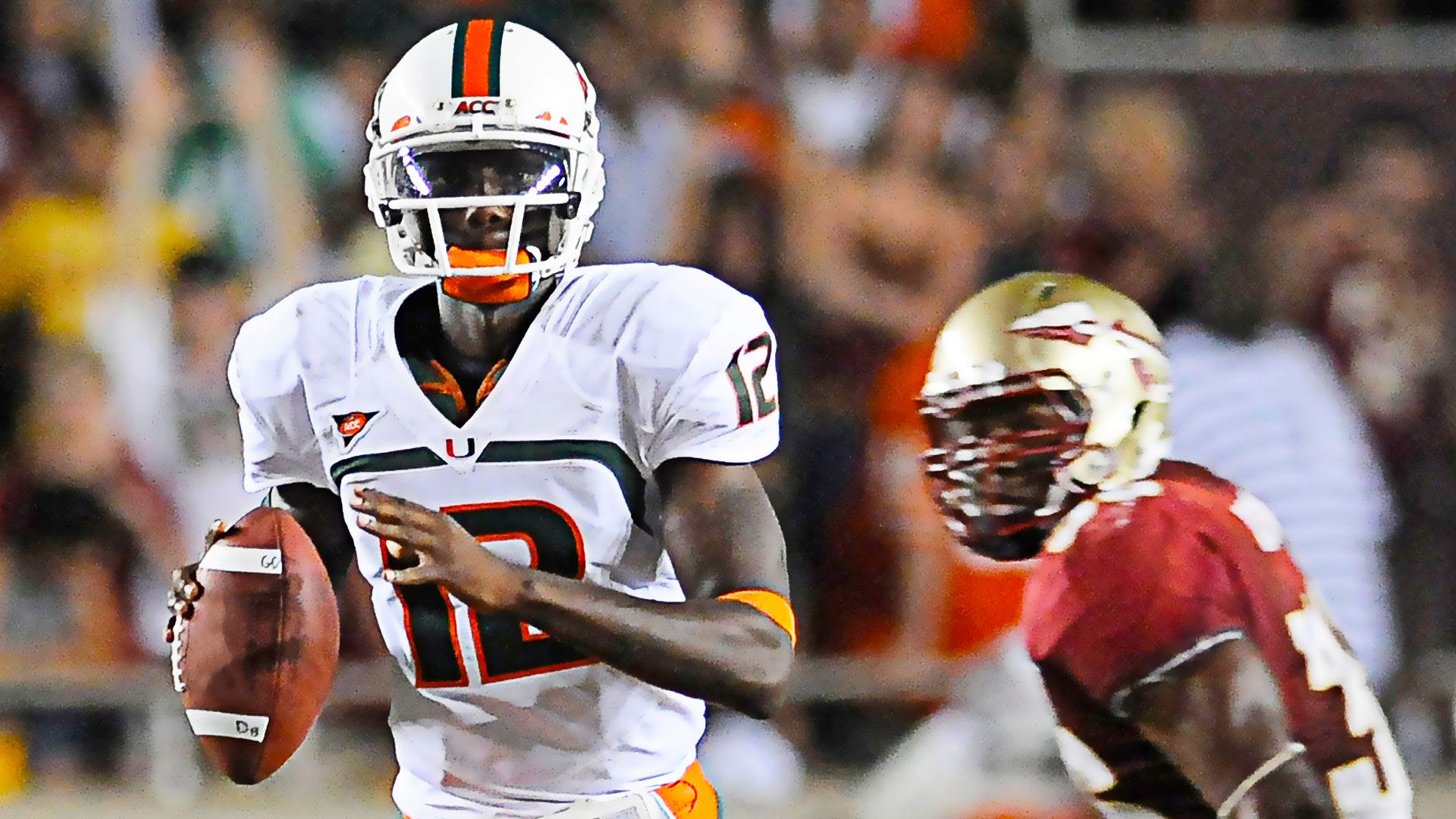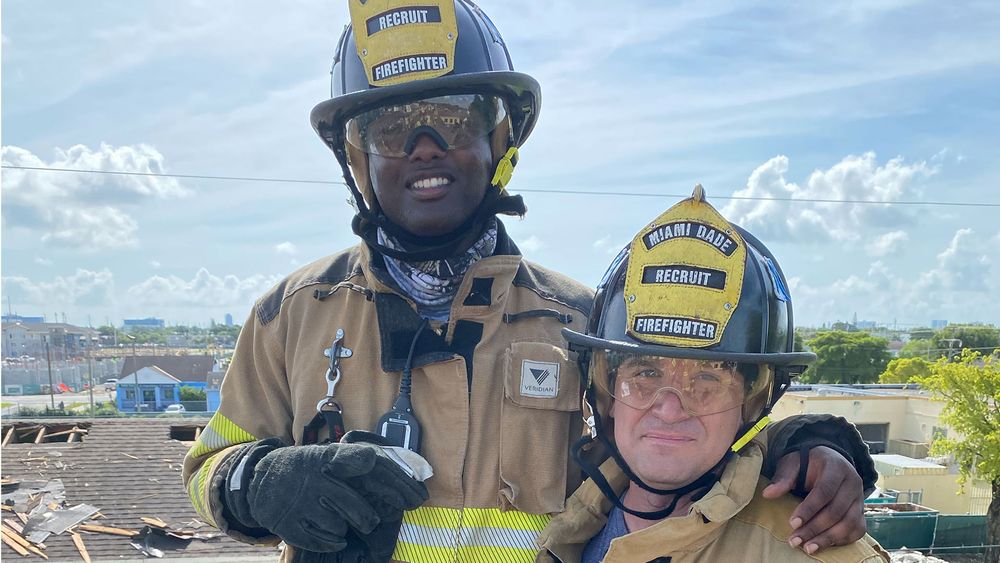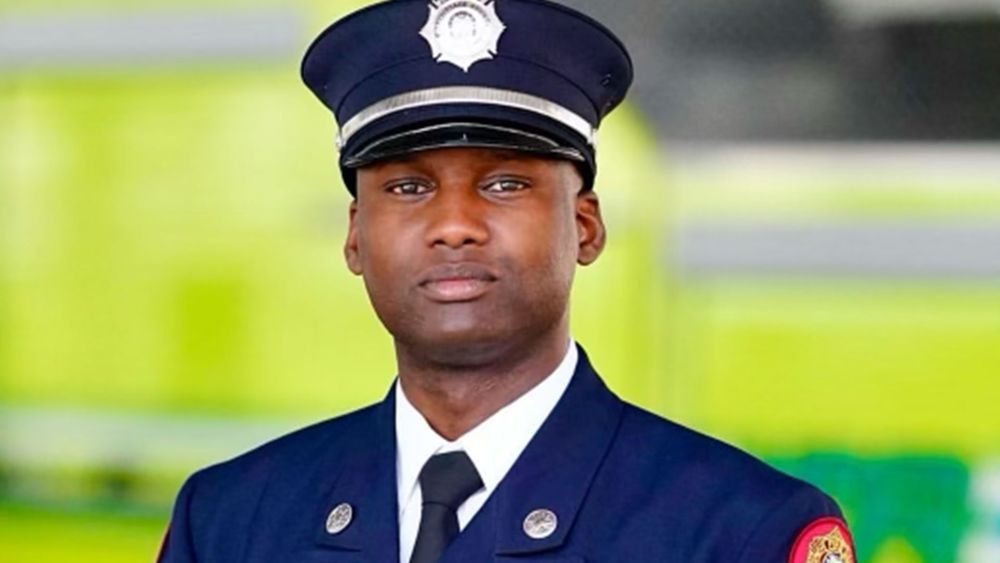“I know I wouldn’t be the man I am today without the experiences I had here..."
Former Hurricanes quarterback Jacory Harris, on his time at Miami
Hometown Hero
CORAL GABLES, Fla. – It was as tough a start to his new career as he could have imagined.
On just his second day as a newly minted firefighter with the Miami-Dade Fire Rescue Department, Jacory Harris found himself being called out to a neighborhood he knew well.
Not far from Miami Northwestern High School – where Harris had once starred as a highly touted, record-breaking, national champion quarterback – two children and two adults had been injured in a drive-by shooting.
As Harris and his colleagues raced to the scene, the former signal caller tried to wrap his mind around the task that awaited them once they’d arrive.
It wasn’t easy – especially given the fact one of the young victims was the same age as his then 2-year-old daughter, Kori.
But even as a rookie firefighter, Harris reminded himself he had undergone the kind of training he needed to do his job to the best of his ability. Staying focused, he knew, would be essential.
It was then, Harris said, that another kind of training kicked in.
“It was traumatic. It was eye-opening, but in that moment, I felt like football helped me, especially my position of playing quarterback,” said Harris, who after his career at Miami Northwestern suited up for his hometown Miami Hurricanes. “You mask your fear and your nervousness, but it’s there. Seeing it, hands on, dealing with two pediatric patients … then getting to the hospital and seeing those doctors putting on their scrubs, it’s like everything slowed down for me.
“Watching [the other firefighters] and watching how those doctors performed inspired me to get to that level where I knew I could be level-headed and know if I do what I was taught in the academy, I could save someone’s life. That helped me.”
Harris would later learn that three of the four patients he and his colleagues stabilized and rushed to the hospital overcame their injuries and survived. And while it hurt to know one of the patients passed away, the entire day – emotions and all – convinced him that he’d found a new calling.
“That day made me realize I wanted to be a firefighter for the rest of my career,” Harris said. “To be in my community and be able to help as much as I can, that’s special. … It’s a blessing.”
From Northwestern to The U
While these days Harris can’t imagine doing any other kind of work, the former quarterback arrived at Miami in 2008 with his eyes set on winning big and hopefully, playing professionally.
A Miami native, he’d grown up watching, and cheering, the Hurricanes.
He’d seen how Miami had produced a plethora of NFL-caliber players and had, in 2001, won a national championship in dominant fashion.
Having the opportunity to wear orange and green – and to do so with many of his talented teammates and friends from high school – was the stuff of dreams, even if his time at Miami eventually came with its share of challenges.
“It meant a lot to be a Hurricane,” said Harris, whose 8,826 career passing yards and 70 career touchdown passes still rank third and second, respectively, in program history. “I wish we could have done more for the program, but we did a lot. Being from Miami and being able to stay home, wear these colors and play with the guys that I went to high school with, those were great times. All of those guys, we grew up together. You had guys from my high school, guys from Booker T. [Washington], guys that went to Belle Glade and Pahokee, that went to all these local South Florida schools.
“We all knew each other or played against each other growing up. All of us to be on one team and get the opportunity to live out our dream and accomplish our goals, that was a great thing, especially doing it here at the University of Miami. We all could have gone other places. We all had offers everywhere. But everybody decided to stay home and try to do everything we could to bring glory back to the University of Miami. But Miami will always be glorious.”
After his time in orange and green ended, Harris had a brief stint with the Philadelphia Eagles before moving on to the Canadian Football League, where he spent six seasons playing for the Edmonton Eskimos, Hamilton Tiger-Cats and Montreal Alouettes.
But even as he tried to make his professional football dreams a reality, Harris always had an eye on the future.
In between seasons, he tried his hand at a series of jobs, from working at a restoration company to serving as a landscaping manager for Miami-Dade County.
Each opportunity was eye-opening, he says, especially since he’d spent most of his life focused on two things: school and football.
“Every offseason, I worked somewhere different,” said Harris, who graduated from Miami with a sports administration degree. “I did things during the offseason to make sure that once football was done, I’d be able to have a smooth transition.”
Finding a Calling
That transition eventually came when Harris and his wife, Kristen, welcomed their daughter.
At that point in 2017, Harris concedes he didn’t know much about the possibility of becoming a firefighter. But his mother, Shebra Pollock, urged him to look into it at the recommendation of one of her colleagues, whose husband was a firefighter.
Harris was intrigued, but knew he still had to get his body right before attempting the application process and trying to pass the Candidate Physical Ability Test required of all fire department applicants.
Football had taken a physical toll on him and to be in the best possible shape to become a firefighter, Harris had to have not just knee surgery, but shoulder surgery and back surgery, too.
He attacked his rehabilitative work and physical therapy with the same intensity that had made him a top-tier college quarterback and when doctors cleared him to take the CPAT test, Harris passed.
Then came Harris’ next challenge: navigating the fire academy.
It’s a challenge that came with its own particular set of difficulties given that Harris entered the academy as a civilian with no firefighting certifications.
“When you come into the academy and you don’t have any certifications, they say it’s like winning the lottery. There are like 12,000 people that apply for maybe 200 positions and I got one of those,” Harris said. “But at the end of the day, you have to spend nine months there, at headquarters. You have to go through three months of minimum standards, which is like state certification to become a firefighter. Then you spend another three months becoming an emergency medical technician. And then once you accomplish those two things, then they can finally start you in SOPs, the standard operating procedures for Miami-Dade County.
“It’s nine months of every day, five days a week, running miles and miles, being in gear for about eight hours a day. It’s tough. It’s not for the weak, I’ll tell you that. Everybody used to always mess with me because I played football. I’d always tell them, ‘I don’t know what position you guys thought I played, but I was a quarterback. We didn’t do much running. And I had a red jersey on, which meant you couldn’t touch me.’”
It was a physically grueling process that tested Harris in ways he couldn’t have imagined. But even on the most difficult days, he powered through. Quitting, he said, was never an option.
Harris graduated from the academy in 2020 and was thrust into the field during the height of the Covid-19 pandemic. Still, as tough as they were, those first days, weeks and months on the job all served as reminders, Harris said, that he’d made the best decision possible.
The fact he’d often be recognized while out on calls only reiterated that fact.
“To be in my community and be able to help as much as I can, that’s dope. … Being in that same neighborhood [as Miami Northwestern] for three, four months, I’d go on calls and see people and they were like, ‘Jacory, you’re a firefighter?’ I know it inspired people,” Harris said. “There were kids that saw me and recognized me, and our conversations went from ‘How do I become a football player?’ to ‘How do I become a firefighter?’ That’s cool.”
Now more than three years into his new career, Harris can’t help but feel grateful for the collective experiences that brought him to this point.
From winning a national championship in high school to sporting orange and green, each moment prepared him for the journey he’s on and the challenges he encounters on a near-daily basis in the field.
And, he noted, there are similarities between donning a football helmet and firefighting gear.
“The camaraderie is the same. It’s like a brotherhood,” Harris said of the work he and his colleagues do together on a daily basis. “I know I wouldn’t be the man I am today without the experiences I had here [at Miami]. It just goes to show you how great the program is. It doesn’t matter how many coaches come through here or what type of season you may have. The U will always be The U and the guys who came before us really set the tone and built this program and established the brand that’s been around forever. …
“Just being able to come to this University, where I graduated, got my degree, and accomplished a lot, that was enough and that was great for me. I love this place and its people. The people here are what make it amazing.”








